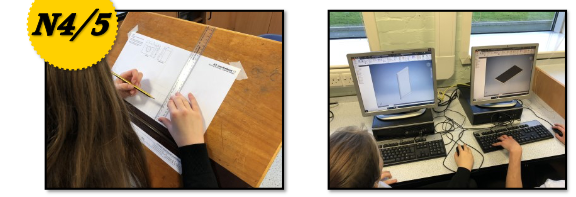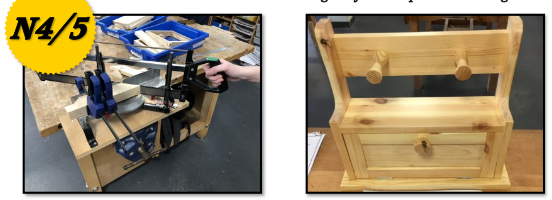Graphic Communication
What will I learn?
With the modern society heavily relying on the creative industry you will learn all about emerging technologies and the skills involved. You will be introduced to the ever-increasing variety of graphics used within design, manufacturing and engineering.
This course will introduce 2D and 3D Computer Aided Design, CNC Machinery including Laser Cutters and 3D Printing, Engineering, Computer and Manual Rendering, Desktop Publishing to create your own magazine spreads, Graphic Design including printing, publishing and animation, creating technical graphics using traditional drawing board methods as well as the more modern CAD techniques.
How will I learn?
A range of resources and techniques are used to carry out the various tasks expected within each unit of work which will be broken into individual folios specifically designed to challenge and test students. Learning is ‘hands on’ and practical with the course being designed to replicate a real world graphics environment.
Theory content is delivered each week to ensure students are best equipped for answering the written extended response questions expected from the examination, boosted with regular homework exercises that have been specially tailored to best suit our students.
Students will require to complete manual and computer based work throughout the academic year.
How will I be assessed?
At National 4 you will complete a Graphics Assignment which is Pass or Fail.
At National 5 there is two components;
Question Paper (80 Marks) 2 Hours- Will assess the learners’ skills, knowledge, understanding and visual literacy through the graphics techniques and practice they have acquired. Accounts for 67% of the course award.
Assignment (40 Marks) – This will draw on, extend and apply the skills and knowledge acquired and developed during the course. Accounts for 33% of the course award and is complete during class time with 8 hours allocated.
Career Opportunities
The STEM Initiative continues to inspire young people to engage and achieve in STEM subjects and create unique career paths moving forward. Students that enjoy Graphic Communication should consider careers, such as; Marketing, Advertising, Digital Design, Desktop Publishing, Animation, Architecture, Engineering, Graphic Design, Computer Aided Design, Print Design, Web Design, Illustration, Surveying, Civil Engineering and Product Design.

Practical Woodworking
What will I learn?
The Practical Woodworking Course is largely workshop-based. It provides a broad introduction to practical woodworking.
Theory is regularly delivered once per week in one of the Graphic Suites within the Technical Education Department.
The Course is distinct in value in that it allows learners to develop practical psychomotor skills (manual dexterity and control) in a universally popular practical craft environment. It helps learners develop safe working practices and to become proactive in matters of health and safety. It allows them to learn how to use a range of tools, equipment and materials correctly and safely.
How will I learn?
Various projects are delivered throughout the year that are designed to develop and push all students creative and motor skills.
Students will have the opportunity to personalise and develop unique skills that will be different from their peers, which creates a challenging environment where each student learns new skills from each other.
A healthy, team based environment is formed early on which helps develop a full understanding of all industrial standards.
How will I be assessed?
Made up of 3 assessment units, a Final Project and a written exam(N5 only):
Various projects are delivered throughout the year that are designed to develop and push all students creative and motor skills.
Students will have the opportunity to personalise and develop unique skills that will be different from their peers, which creates a challenging environment where each student learns new skills from each other.
A healthy, team based environment is formed early on which helps develop a full understanding of all industrial standards.
Unit 1:
Unit 2:
Unit 3:
Final Project: SQA Assignment (70%)
Written Exam: 60 Marks Available(30%) 1 Hour
Career Opportunities
Our local community actively seeks skilled professionals with varying modern apprenticeships available to keen students. Students that enjoy Practical Woodworking should consider careers, such as; Joinery, Craft Work, Electrical Engineering, Furniture Manufacture, Plumbing, Toolmaking, Pipefitting, Engineering, Motor Vehicle Repair, Vehicle Body Repair, Welding and Fabrication, Blacksmithing, Carpentry and Painting and Decorating.


